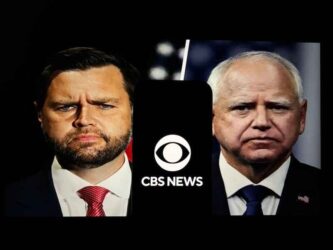Notable Omissions From Last Night’s VP Debate
Joe Hill|October 2, 2024

Oops.
We did it again.
We stayed up too late watching political theater when we would have been better off doing… well, pretty much anything else.
But what’s done is done. So, here’s our brief report on what we saw (and what we didn’t).
While last night’s match-up between Sen. JD Vance and Minnesota Gov. Tim Walz lacked the energy of September’s debate between Harris and Trump, there were a few fiery moments.
Particularly, at the very end, when Walz asked Vance whether Trump won or lost the 2020 election.
We won’t go there.
In fact, we’re far more interested in last night’s notable omissions.
Take, for example… debt.
As I write, the U.S. national debt clocks in at $35.4 trillion. It’s such a staggering number that – as Shah recently pointed out – it’s practically lost all meaning.
And yet, it’s also a highly consequential number. According to Shah, if it reaches a breaking point, “it could lead to significant consequences for everyone, including job losses and a reduction in public services.”
It also sends a signal to the undereducated masses that debt doesn’t matter.
Once again, in Shah’s words:
Most consumers likely don’t understand or think about what we as a nation owe other countries. While they can feel the direct effects of their own debt – like credit card bills or student loans – the national debt feels more abstract.
This disconnect leads to a lack of urgency or concern about larger fiscal issues.
When politicians prioritize spending without dealing with debt, it sends a signal that it’s ok to ignore fiscal responsibility everywhere else.
And yet… throughout last night’s 90-minute debate, the word “debt” was only uttered twice…
Once by each candidate.
And in neither case were they talking about the $35.4 trillion hole our country is now in.
Another phrase that was hardly uttered was “nuclear energy.” (Not surprisingly, we did hear some chatter surrounding Iran’s nuclear weapons program.)
It should come as no surprise to fans of nuclear power. The industry has been reeling from over-regulation since before this author’s time on Earth.
And yet, our energy demands – and, specifically, clean energy demands – have grown exponentially.
The advent of technologies like AI and blockchain will only ramp up that demand further.
It’s why, as noted in Shah’s Monday Takeaways, Microsoft (MSFT) is now planning to buy up all the output from the soon-to-be resurrected Three Mile Island nuclear plant in Middletown, Pennsylvania.
And it’s not alone.
Amazon (AMZN) recently purchased the land next to another nuclear facility (also in Pennsylvania) with plans to open its own data center.
“The takeaway from there?” Shah says. “Go look at nuclear stocks and nuclear options.”
With Silicon Valley behind it, the industry may finally be back on the mend.
Not that anyone watching last night’s debate would know it.
There was also very little mentioned about inflation or interest rates – curious in a year when voters’ No. 1 concern is the economy.
Things have gotten especially confusing lately.
As you know, a lot of folks weren’t sure how to parse the Fed’s recent 0.5 basis-point cut. The markets rallied while folks like Jamie Dimon warned that a recession may be around the corner.
But while the folks on stage preferred to keep the discussion focused on immigration and housing costs, there’s a whole lot more that’s impacting the economy – and the wallets of everyday Americans – right now.
Robert gave his comments on the state of things in yesterday’s Total Wealth piece.
As always, you’ll find links to that and everything else we’ve published below.



